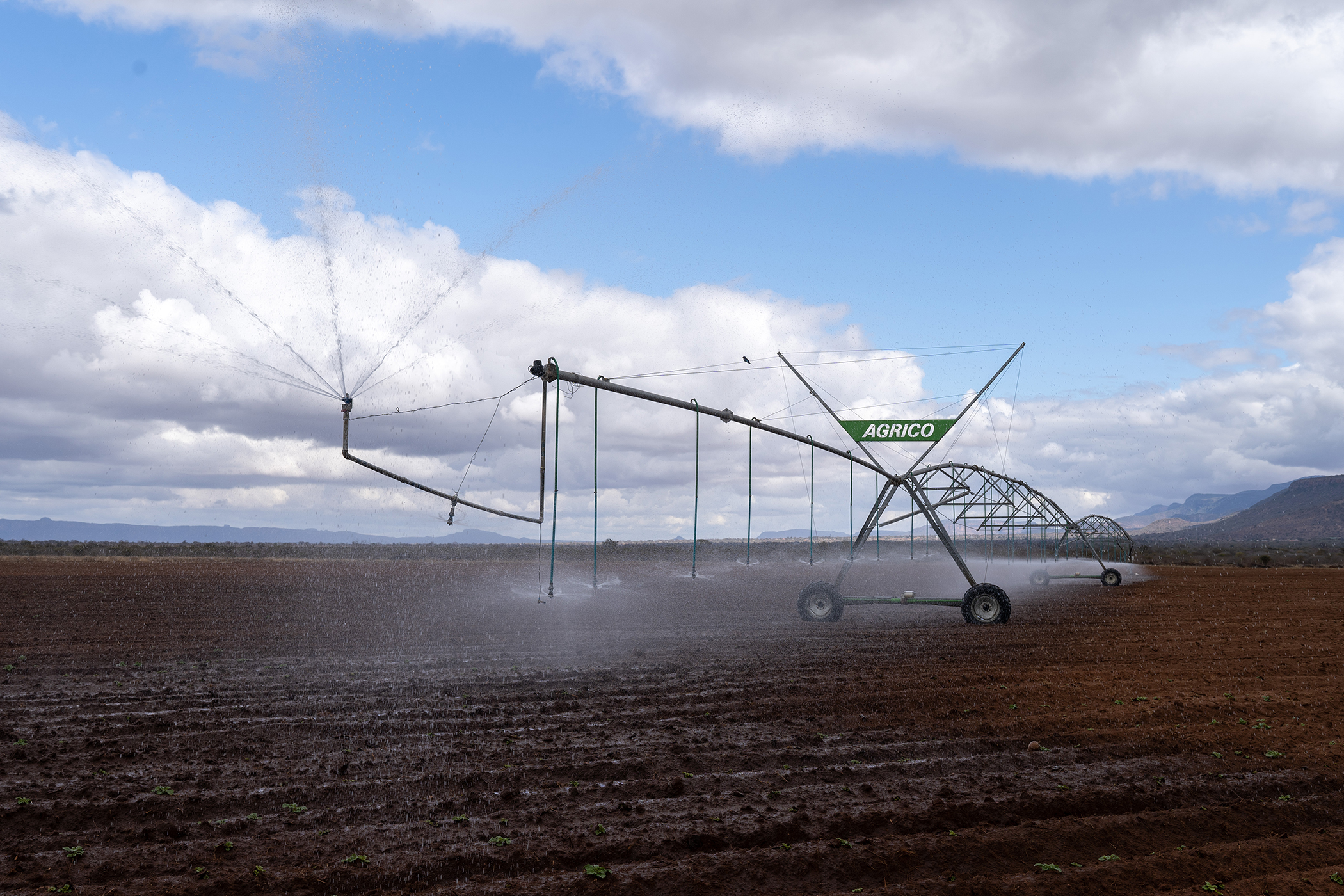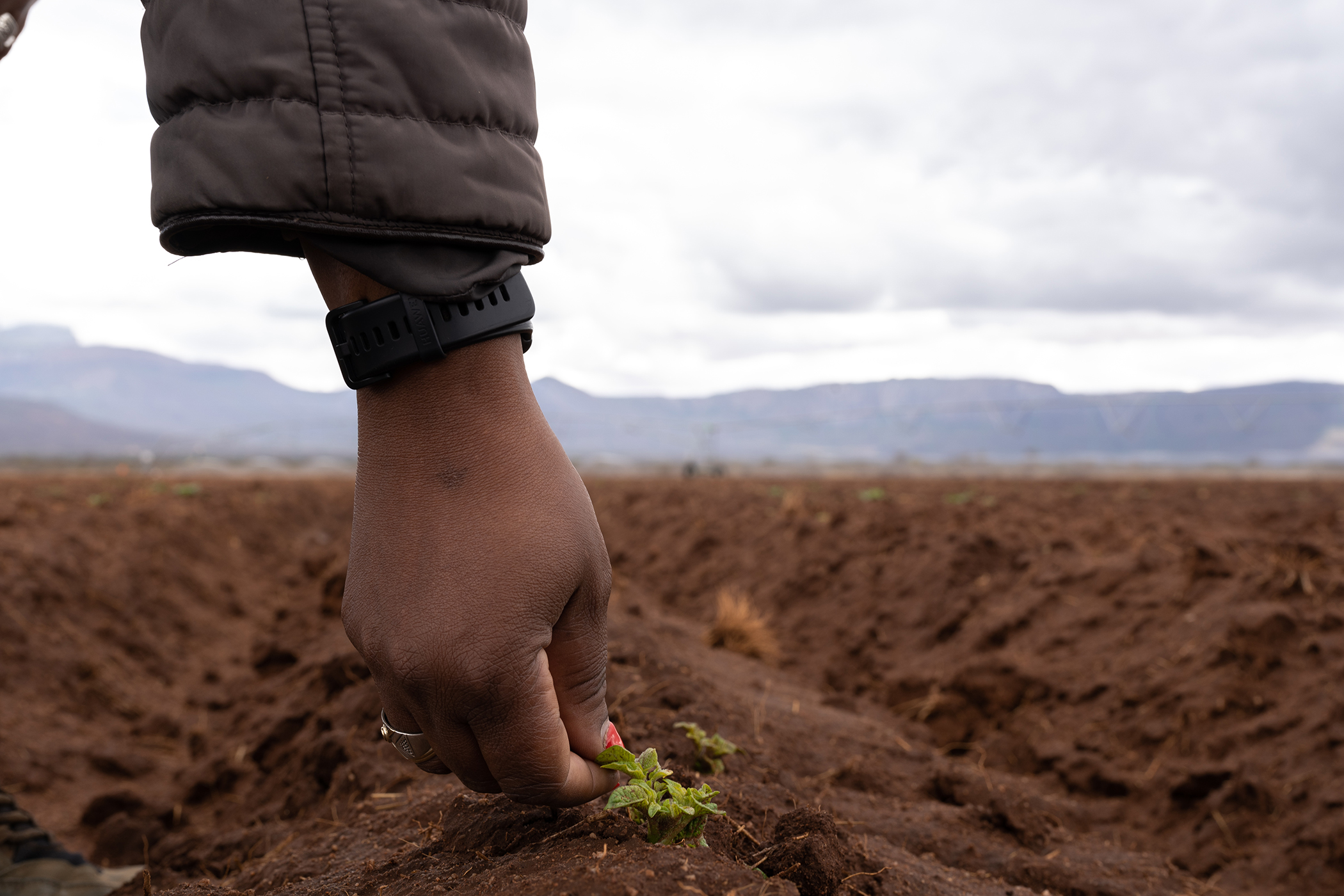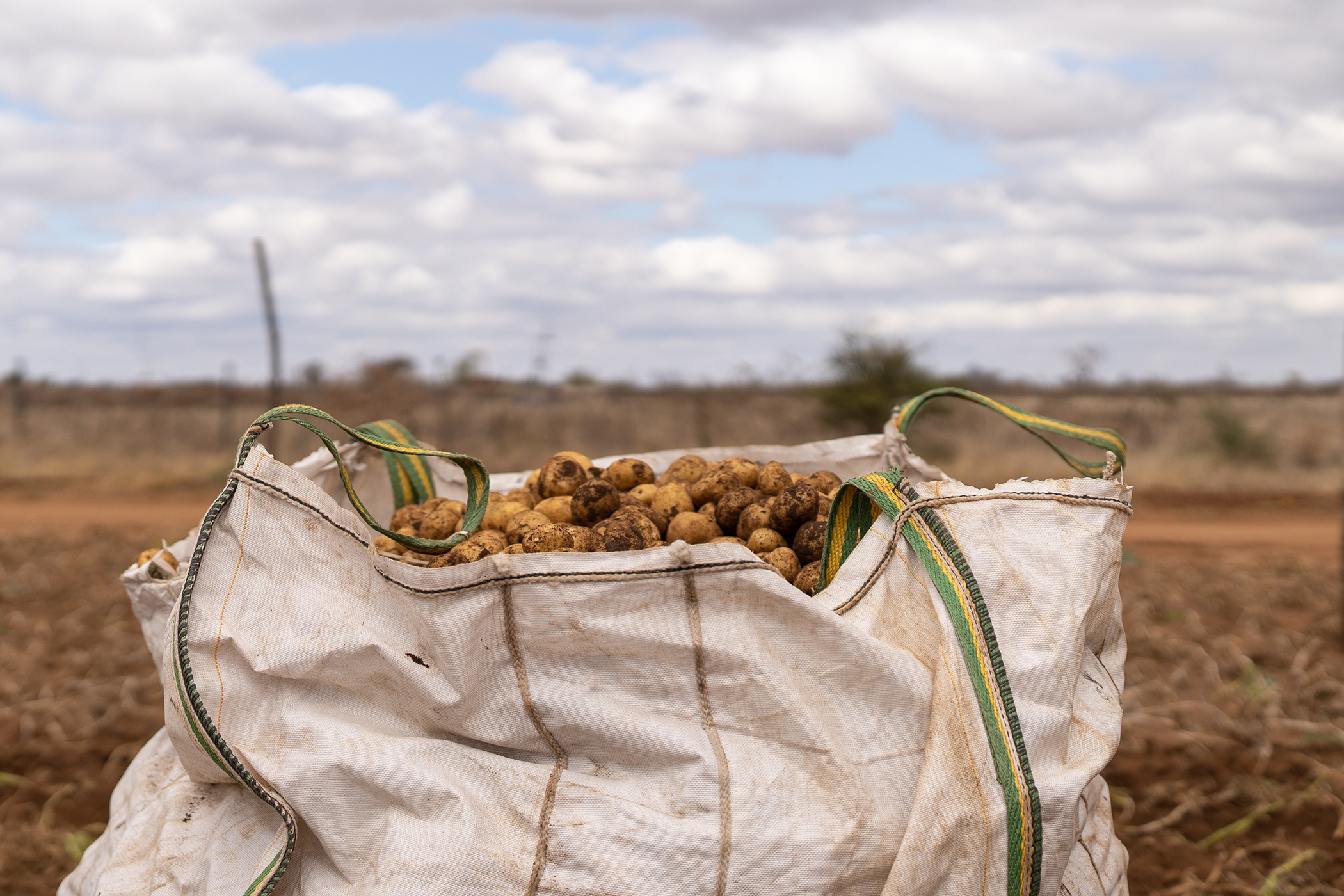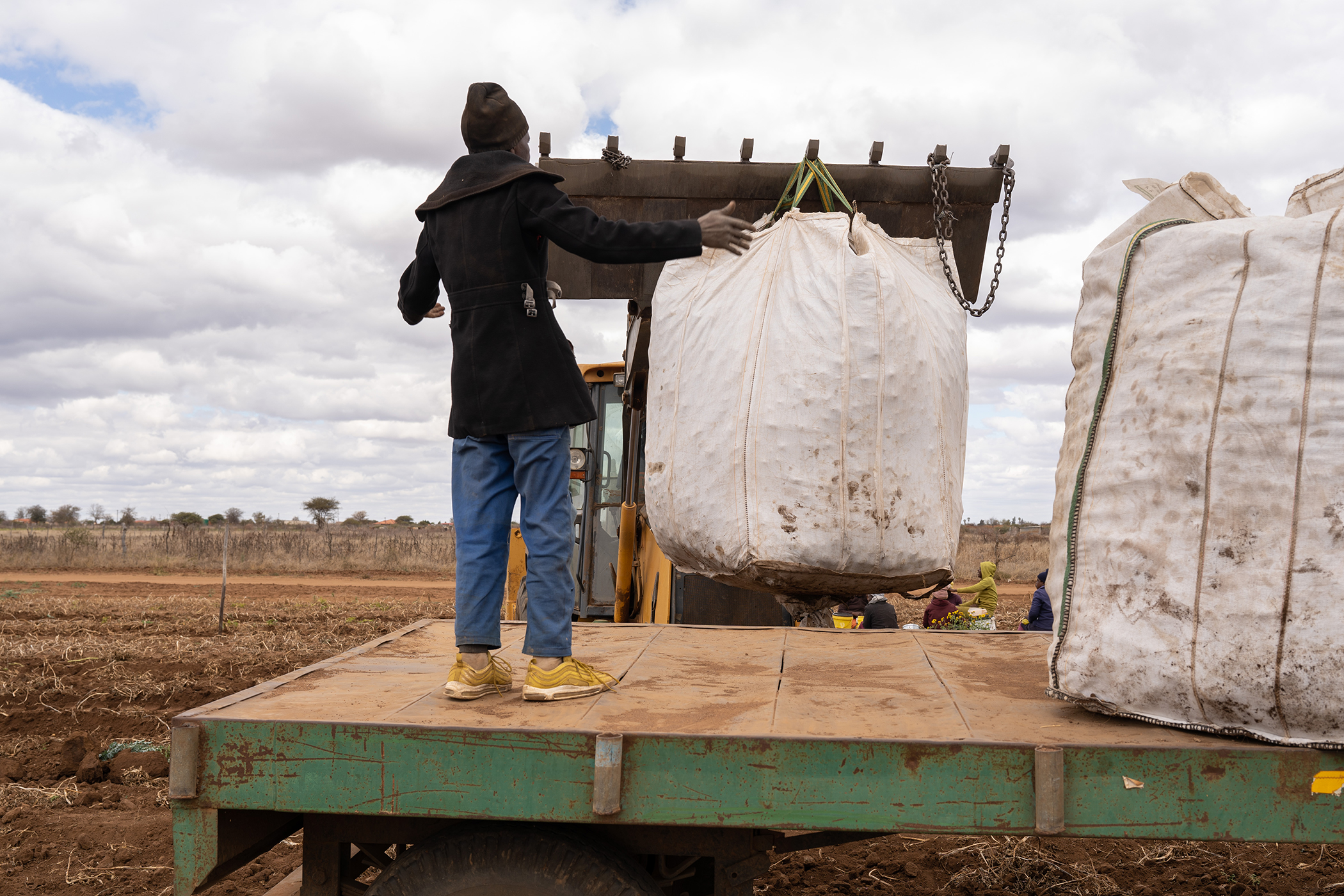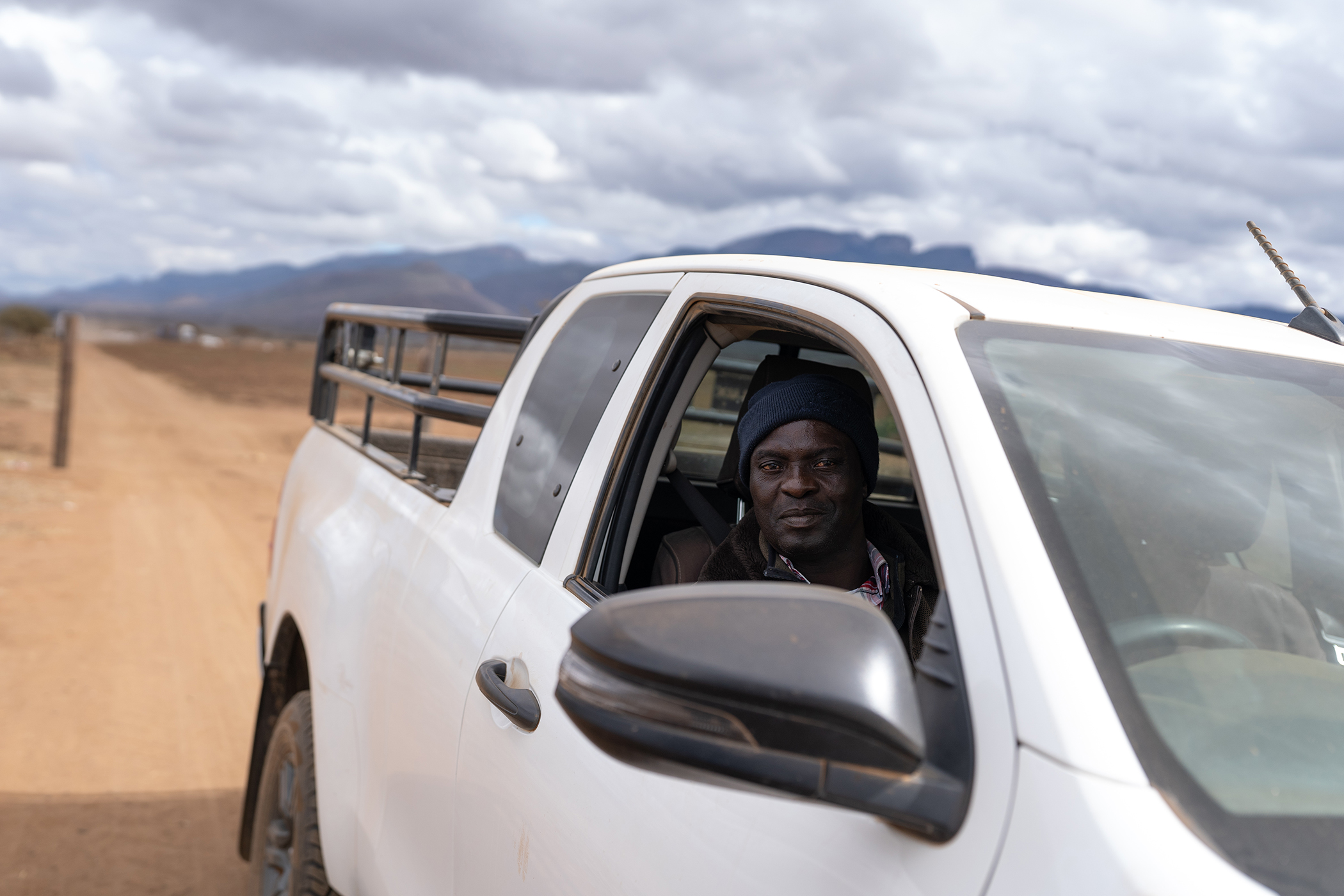The Limpopo sky is covered with clouds that threaten rain. Periodically a wind blows, agitating the cold air and stirring up dust devils. Zelda Masoga walks across the dry sand bed where potatoes were just harvested. She wears a military-green tracksuit, covered by a warm grey puffer coat, along with a beanie and dark sunglasses. It is winter, after all.
In the fields, a tractor drags a mechanised potato harvester that churns up the soil, leaving potatoes exposed. Workers pick them out and place them in small bags, before offloading those bags into larger canvas ones that hold over a ton of potatoes. A loader lifts each bag onto a flat-bed trailer, drawn by another tractor, and drops them at another location.
Today’s crop was planted three months ago. The potatoes from this harvest, which are of the FL 2027 varietal, are being sold to PepsiCo South Africa, which will use them to make crisps. While Zelda has been farming at the small-holder scale since 2017, this harvest in particular brings with it a sense of anxious anticipation.
Starting Out in Marobjane
 Zelda and Andries Masoga at the farm, Mazeli Farming Projects, on Aug. 3, 2023. While Zelda is the one that started the farm, the couple now works as a team, with Andries acting as the general manager.
Zelda and Andries Masoga at the farm, Mazeli Farming Projects, on Aug. 3, 2023. While Zelda is the one that started the farm, the couple now works as a team, with Andries acting as the general manager.
Zelda and her husband, Andries Masoga, live in a village called Marobjane in Limpopo, in the Capricorn District. The area has a semi-arid climate and water is hard to come by. Many of the homes in their area once had gardens with beautiful trees and plants, but due to water shortages, where there once was grass, only sand remains.
Despite the water-related challenges in Marobjane, it is where Zelda first started farming. She and her husband ran a tuck shop directly across from their home and it was behind there that she first started planting vegetables.
“I planted spinach, beetroot, and tomatoes … I wasn’t doing it for business purposes, but eventually people started coming, wanting to buy my [produce],” she tells Global Citizen.
The interest in buying her vegetables led her to expand her garden onto the plot next to the tuck shop. Eventually, she decided to invest in a farming business and she approached the tribal leadership to ask to be granted the use of land for farming. They agreed and she now leases 100 hectares of the communal land, which is home to her farm, Mazeli Farming Projects.
Working as a Woman — in a Male-Dominated Field
 Zelda and Andries Masoga look on as farm workers pick up potatoes and load them into bags on Aug. 3, 2023.
Zelda and Andries Masoga look on as farm workers pick up potatoes and load them into bags on Aug. 3, 2023.
“I didn’t think the bigger land would be a problem, but there were lots of challenges,” Zelda says. “We wanted to lay [irrigation] pipes, but we didn’t have experience with laying pipes. We didn’t have experience with fertilisers or spraying.”
She was also quickly introduced to the challenges of being a woman in what is commonly known as a male-dominated sector. Expanding from planting vegetables on a small plot to hectares of land was not a straightforward process.
The first time Zelda bought equipment to fertilise her crops, for instance, she was sold damaged equipment. She believes the seller did it knowingly because she is a woman. After she complained to the company, they showed up with exact replacements for each of the faulty parts.
Having larger crops also meant that Zelda needed to hire staff to work in the fields. This presented yet another gendered challenge as she felt that the men she hired did not always respect her and she was also not always comfortable checking up on them after dark when harvests ran late. Eventually, Andries came on board as the farm’s general manager and he has since taken care of managing the farm and personnel, leaving Zelda to concentrate on the business of it all.
Today, Zelda will only undertake the task of planting a new crop after completing extensive market research, but when she first started out, she planted what she knew. The first crop she planted on the newly leased land was a tomato crop. Everything went well with the harvest, but she didn’t have a market for the tomatoes and they ended up spoiling in the fields — an expensive lesson was learned.
 Zelda Masoga is photographed on her farm on Aug. 3, 2023. She is anxiously awaiting the results of the current harvest, while simultaneously planning the next one.
Zelda Masoga is photographed on her farm on Aug. 3, 2023. She is anxiously awaiting the results of the current harvest, while simultaneously planning the next one.
Market and Crop Diversification
Leaving the harvesters to do their work, Zelda drives to another section of the farm. There, the soil is being irrigated by a pivot sprinkler system. The wet soil is a dark brown and lined with rows of green leaves.
She is growing a different variety of potatoes (Mondial) on this plot of land, with 90% of the harvest destined for Mozambican markets.
The farm also grows peppadews on a contractual basis for export markets and butternut squash, which is grown for both local and international markets.
In each planting section, Zelda explains that she rotates her crops between potatoes, butternut squash, and peppadews, but adds that “the soil also needs time to rest.”
A bit away from the Mondial potatoes, another patch of land is being prepared for butternut squash. Instead of using the pivot irrigator, this patch uses a drip irrigation system, which was set up with the help of Phopi Raletjena, a friend of Andries, who is also a commercial farmer and has become a mentor to Zelda.
According to Zelda, the drip irrigation system is a cheaper alternative to the pivot irrigation system they use when planting many hectares of potatoes and it uses less water, which makes it more sustainable.
Sustainable practices are becoming more and more important as climate change becomes a bigger issue.
In 2022, Zelda experienced this firsthand with her butternut squash crop.
Climate Change in Limpopo
“Climate change affects us because the weather is no longer the same. The weather is unpredictable, actually. We don’t know which cultivar to plant at which time. Some require lower temperatures, others require higher temperatures, so it’s challenging,” Zelda says.
In 2022, for example, Zelda explains that the winter was longer than expected, and that led to both smaller-sized butternut squash as well as a yield that was 50% lower than expected.
Professor Sylvester Mpandeli of the University of Venda, an expert in water and irrigation, explains that challenges related to climate change are here to stay for small-holder farmers.
“Climatic variability is going to be with us for a very long time. The frequency and intensity [of the variability] is very problematic,” he tells Global Citizen. “Which means we have to up our game to make sure that we don’t get caught off guard.”
 Butternut squash that were too small to sell commercially are left behind for the sheep on Aug. 3, 2023.
Butternut squash that were too small to sell commercially are left behind for the sheep on Aug. 3, 2023.
Mpandeli says that small-holder farmers need to take strategic decisions based on seasonal climate projections. He says that while early warning systems for seasonal changes are in place, the dissemination of the information takes time and sometimes only reaches farmers after they have already been affected, which is something that needs to be urgently addressed.
“It’s going to be difficult for small-holder farmers … especially those farming in the drier areas,” he adds.
Mpandeli says that the availability of water “all the time” will become a bigger challenge as well.
Zelda was given a water reservoir by the government, which allows her to properly irrigate her crops. However, using the reservoir has exposed another challenge specific to South Africa.
Water can only be pumped from the reservoir when electricity is available, and because of South Africa’s energy crisis, power is cut periodically to ease the demand on the electricity grid. The power can be shut off for as long as eight hours during a day. What this often means is that only one crop can be irrigated at any given time.
To mitigate the effects of the power cuts, Zelda would have to purchase a costly electricity generation solution, which would require a substantial capital investment. Unfortunately, access to loans is another obstacle that farmers like Zelda face.
Access to Land and Financial Exclusion
 Three of the permanent staff employed by Zelda Masoga cook a meal for the evening on Aug. 3, 2023.
Three of the permanent staff employed by Zelda Masoga cook a meal for the evening on Aug. 3, 2023.
Nonie Mosoke, an independent trustee of the Kgodiso Development Fund (KDF), and a Black woman farmer herself, believes that the nexus of Zelda’s challenges, and that of new Black farmers in general, is the lack of land ownership.
“Black farmers such as Zelda … have great difficulty in getting access to funding. Where do you get that funding if you don’t have secure land tenure?” Mosoke asks.
She explains that the formal banking systems view Black farmers as too risky and so are always looking for a third party to secure their loans. This market failure has to be corrected if women like Zelda are to succeed, Mosoke tells Global Citizen.
“The reality is that until the banks can actually acknowledge this and do something to fundamentally change their system, not on the basis of corporate social responsibility, but on the basis of commercial agriculture, the commercial landscape is going to change very slowly and insignificantly,” she says.
KDF, which is an independent fund founded by PepsiCo Inc., works to provide support for small, medium, and micro enterprises, as well as emerging farmers and enterprise development across PepsiCo South Africa’s value chain.
According to Mosoke, Kgodiso Fund attempts to mitigate the risk for lenders through holistic farmer development, part of which is funding farmers like Zelda.
The funding covers the seeds, which account for 30% of the input costs, diesel, electricity, and labour. The farmers then sell their produce into the PepsiCo market. It’s through funding from Kgodiso Trust that Zelda produced the FL potato harvest for PepsiCo South Africa.
In addition to skills development, and market access, the goal of Kgodiso Trust is to enable farmers to build strong balance sheets that may improve their chances of getting loans in the formal financial system in future, which will help them to become competitive and sustainable commercial farmers.
As sundown approaches, sheets of light stream down through the clouds onto the Blouberg National Park’s mountains, forming a backdrop for a few of the permanent workers who are cooking under a tree. Andries says they worked until 9 p.m. the night before and he really wants the staff to be able to knock off at 5 p.m. today… But another truck has just arrived and it needs to be loaded up, so it doesn’t look like they will be able to finish anytime soon.
Zelda and Andries inspect the potatoes arranged in crates, waiting to be lifted onto the trucks, pulling out bits of dry grass and leaves when they see them.
This was the first crop they planted with the support from PepsiCo. The varietal that Zelda was given was new to her. During the process she had to deal with late blight, a disease that is caused by a water mould. As a result, they managed to harvest only 35 tons as opposed to the 55 they expected.
Andries says that in 2024 they will produce another harvest for PepsiCo South Africa, but this time they will be prepared to deal with issues such as potato blight.
With the work on the harvest nearly complete, the persistent farmer has to wait for about a month to hear how much of her harvest meets PepsiCo's quality standards.
“Farming,” Zelda says, “requires a lot of patience.”
 Zelda Masoga, photographed in front of a crop of Mondial potatoes that will soon be ready to harvest, on Aug. 3, 2023.
Zelda Masoga, photographed in front of a crop of Mondial potatoes that will soon be ready to harvest, on Aug. 3, 2023.
Farmers on the Front Lines is a three-part series that explores the challenges, resilience, and practices of female farmworkers.
Disclosure: This series was made possible in part with funding from the PepsiCo Foundation.
